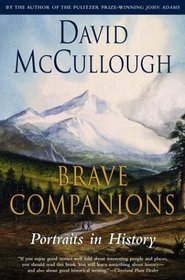To say I am a fan of McCullough is an understatement. I have read most of his books and enjoyed them immensely and would find it difficult to pick which of them I liked best.
I found most of "Brave Companions" very interesting reading. However, I feel the final essays in this book leave much to be desired and wished I had just skipped over them. In fact, some of them I just ended up scanning. And frankly, if in the little time I have left on Earth I never again read anything about photographer David Plowden, whom McCullough greatly admires, I will die a happy man.
One piece of trivia I picked up in the essay on the Panama Canal was something I had never come across in any of the books I read about this great engineering project was the fate of the many workers who died from tropical diseases and other hazards. Here is what McCullough reports on pages 97-98:
"Since a large percentage of the dead men had no known next of kin, no permanent address, often not even a known last name, it was decided to pickle their bodies in large barrels, then sell them in wholesale lots. The result was a thriving trade with medical schools around the world, the proceeds going to finance a small railroad hospital in Colon."
Considering last year's expose of a Texas hospital selling the bodies and body parts of deceased patients, and the furor it caused, I doubt this is something the U.S. Canal Commission could be proud of. Better to have buried them in decency. And I say this even though I am listed as an organ donor on my driver's license.
As usual, an absolutely fantastic, eminently-readable history book from David McCullough, touching on everything from the Brooklyn Bridge to pioneering pilots to the eccentric, wealthy Rothschild descendant who devoted her life to studying insects. A wonderful book.




![header=[] body=[Get a free book credit right now by joining the club and listing 5 books you have and are willing to share with other members!] Help icon](/images/question.gif?v=90afaeb39)
